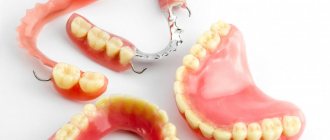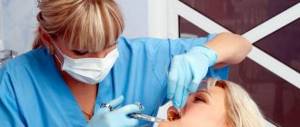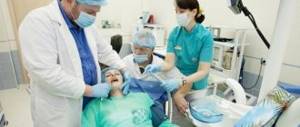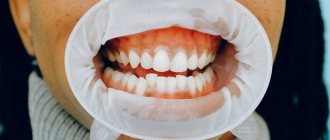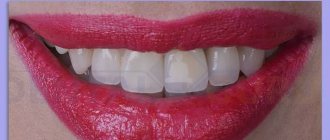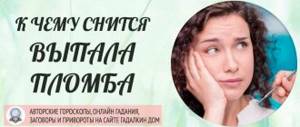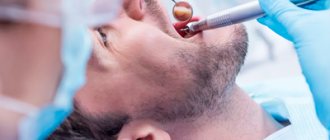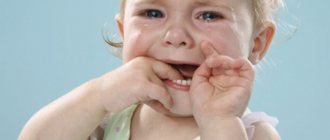There are no absolute contraindications for treatment and tooth extraction during pregnancy. On the contrary, if the necessary treatment or tooth extraction is not carried out, this can have a detrimental effect on the health of the mother and the unborn child.
Pregnancy is a very important stage in the life of any woman. A huge load on the body, a strong hormonal surge, and a lot of vitamins and minerals are spent on the formation and development of the baby. Naturally, the lack of many nutrients, especially calcium and phosphorus, does not have the best effect on the health of the mother’s teeth. Also, during pregnancy, the composition of saliva changes, hypersalivation predominates, and the gums become loose, due to an imbalance of hormones. Before becoming pregnant, it is advisable to regularly undergo dental examinations, necessary treatment and professional hygiene in order to avoid future tooth extraction.
Any dental intervention must be approached with full responsibility. The dentist needs to coordinate all steps with the obstetrician-gynecologist. Local anesthesia is selected by carefully collecting the pregnant woman’s medical history and, naturally, one that does not have a detrimental effect on the fetus.
Is it possible to remove teeth in position?
Since many medications are prohibited during pregnancy, expectant mothers refuse to have their teeth treated or removed and endure pain until childbirth. But in many cases such a measure is not justified. It is possible and necessary to carry out treatment or extirpation, the main thing is to do it correctly.
Anesthesia is done using local drugs that have minimal side effects and do not have a negative effect on the fetus. However, the operation is performed only if there is an urgent need.
Indications for extraction:
- pulpitis, periodontitis, in which neighboring tissues become infected;
- deep carious lesion affecting the root;
- cyst or malignant neoplasms;
- growth of a figure eight, complicated by inflammation or if it presses on an adjacent molar;
- tooth root fracture;
- rapid development of periodontal disease, which is not amenable to therapeutic treatment.
If a pregnant woman experiences pain when chewing, she will not be able to eat properly, which leads to a deficiency of nutrients. This situation negatively affects her body, the formation and growth of the fetus.
The doctor considers each case individually. If possible, reschedule the operation for a more convenient time.
Indications for surgery
Indications for surgical intervention are:
- acute pain;
- wisdom teeth grow incorrectly during pregnancy;
- rapidly spreading caries with severe pain, the root is completely destroyed;
- purulent inflammation of the gums and dental tissue;
- increased body temperature due to dental disease;
- neoplasm;
- injury, tooth fracture.
The decision to remove a tooth from a pregnant woman should be made by a specialist. Many people have been afraid of the dental office since childhood. During pregnancy, you should overcome your fear and cure a sore tooth without causing inflammation. There is no need to wait until the pain becomes unbearable and try to overcome the disease on your own. Toothache cannot be eliminated using traditional methods.
If your tooth is inflamed and hurts, you should visit the dentist as soon as possible; doctors on duty can see you without an appointment at the district clinic or at a specialized medical center. You should not refuse to have your wisdom tooth removed out of fear or reluctance. Purulent inflammation will have a detrimental effect on the fetus. Pathogenic microorganisms can be transmitted to a child, the most dangerous of which is Staphylococcus aureus.
How does the timing of tooth extraction affect pregnancy?
In case of severe inflammation and pain, it is not always possible to postpone surgical intervention. If there are indications for extraction of a dental unit, then the possibility of carrying out the procedure must be agreed with the therapist and gynecologist. In this case, the period of bearing the child is important. Each trimester has certain restrictions and possible complications for the mother and fetus.
Possibility of extirpation according to timing:
- First trimester. The placenta is being formed, the organs and systems of the child are being formed, so any medical manipulations are performed with extreme caution and only according to strict indications. During this period, most drugs are contraindicated, and surgery without them is impossible. Medicines, x-rays, and computed tomography have a negative effect on the fetus, causing various abnormalities. Some medications cause miscarriage. Even treatment of deep caries can be postponed to a later date. However, there are situations that do not allow you to avoid removing a diseased tooth. If there is severe pain and inflammation, this leads to hypertonicity of the uterus, nervous breakdowns, spread of infection to other organs, and infection of the fetus. In this case, the dentist can perform the operation despite contraindications.
- Second trimester. After 3 months, the fetus is formed and the placenta is well protected. During this period, many types of treatment are allowed, including extraction, except for complex cases with a figure eight. Mother's stress and medications do not have such a strong effect on the child and pregnancy. Local anesthetics can be used safely. Before a CT scan or X-ray, a woman puts on a special protective apron.
- Third trimester. Surgical intervention is highly undesirable. Although the fetus has become physically stronger, by this time the placenta is thinning and protects it less well. In addition, the period is dangerous for premature birth. Stress and pain can cause uterine contractions. Starting from the thirty-fourth week, almost any treatment is stopped.
At any time, extraction is carried out for purulent inflammation, which cannot be cured by therapeutic methods. In addition, if a pregnant woman suffers severe pain and is constantly under stress, this can have a bad effect on the child’s psyche.
Removal
As practice shows, only in 5% of cases pregnant women have to pull out the “eight”. In other situations, it is possible to do without deletion. Extraction is permissible only if there are strict indications, including:
- inability to relieve severe pain using available painkillers;
- frequent recurrence of pericoronitis;
- the formation of an abscess affecting the facial nerve;
- destruction and suppuration of bone tissue;
- the formation of a hollow tumor on the bone in the figure eight area.
In all these cases, the woman is scheduled for dental surgery. Anesthesia is selected taking into account the duration of pregnancy and existing concomitant diseases. However, earlier than in the second trimester, extraction is contraindicated.
Wisdom tooth removal during pregnancy: risks and complications
Surgery on the third molar is the most difficult. The procedure itself has a high probability of developing complications, especially in the lower jaw. Extracting the root of a lower extreme molar requires cutting into the gum and removing part of the bone, which is a more traumatic surgical procedure than a simple procedure.
After extirpation of the figure eight, body temperature may rise, severe pain in the jaws, head, neck, throat, swelling of the face and other negative phenomena may occur. The recovery period is long and painful. For these reasons, surgery is performed only in extreme cases: if there is a risk of infection spreading, or if there is severe, ongoing pain.
If it is possible to wait until childbirth or at least until the 2nd trimester, then the extraction of the figure eight is postponed.
Removal of tooth nerve during pregnancy
Depulpation is done for deep caries, when pathogenic microflora has penetrated the root canal and affected the pulp. Treatment requires local anesthesia, so the procedure is not recommended in the 1st trimester.
In order to leave the dental unit alive, they try to cure the nerve. If most of the pulp is affected, it is completely removed. If the nerve is treated with a therapeutic method, then the pregnant woman should regularly visit the dentist, as a relapse of the disease is possible.
Modern clinics do not use arsenic, which is absolutely contraindicated for pregnant women. For treatment, safe drugs with natural ingredients are used.
How is the procedure done?
If a woman suffers from toothache, she needs to urgently visit a dentist. The doctor will recommend further actions: treat the tooth, put a filling or remove it. You should immediately give the specialist information regarding the duration of pregnancy, concomitant diseases and drug tolerance.
If extraction is necessary, it is recommended to consult with a gynecologist observing the pregnancy. He will clarify the woman’s contraindications and recommend a specialized clinic.
When diagnosing, the dentist must assess the condition of the entire dentition. To clarify the diagnosis, you can undergo a radiovisiography study. This device also provides radiation, but it is minimal. During the procedure, the expectant mother wears a special apron that will protect the baby.
Next, the oral cavity is sanitized and pain is relieved with safe anesthetics. Numbness will be felt within a few minutes and will last for an hour.
Remove the diseased tooth using forceps. The procedure is painless, because the doctor will wait until the drug begins to act. After the tooth is extracted, the dentist will examine the socket for root remains. The duration of the operation ranges from several minutes to half an hour, depending on the complexity of the tooth location and its characteristics. A gauze swab with medicine is placed on the gum.
Tooth extraction during pregnancy: anesthesia and medications
Anesthesia is required for surgery. General anesthesia is not acceptable. Anesthesia with lidocaine and similar anesthetics with adrenaline is also not carried out for pregnant women. The drugs can cause cramps, muscle weakness, severe allergic reactions, and lower blood pressure.
Modern painkillers contain a minimum of adrenaline and do not contain vasoconstrictor components that cause uterine hypertonicity. When applied topically, they are practically not absorbed into the blood, therefore they are safe for the fetus.
Among the acceptable medications, the safest ones can be identified:
- Ultracaine;
- Alfacaine;
- Artifrin;
- Primacaine;
- Ubistezin.
During forced surgery, you do not have to endure pain, as happened several decades ago. Today, extraction is done absolutely painlessly.
If gum tissue is cut during surgery, antibiotic therapy is necessary. Pregnant women are usually prescribed Amoxiclav, which has an antibacterial and bactericidal effect. To reduce fever, a minimum dosage of Paracetamol may be prescribed.
Chlorhexidine, Miramistin, Romazulan - safe antiseptics - are used for mouth rinsing.
What to do after tooth extraction during pregnancy
Even if the procedure was successful, without pain, complications may develop during the recovery period. It is very important that after extirpation a blood clot is formed and firmly attached. It protects the resulting cavity with exposed bone and nerve endings from infection by bacteria and food.
The natural “plug” may come off in the following cases:
- sticking to a cotton swab (placed after surgery) if held for too long;
- licking the hole with the tongue;
- using a drinking straw;
- newly opened bleeding.
If the blood clot falls out, a new surgical intervention will be required. Otherwise, an inflammatory process will occur, which can lead to complications.
It is not recommended to get tired on the day of surgery. After the procedure, you need to go home and rest. You can eat after 3 - 4 hours. Food should be at a comfortable temperature, soft or liquid. Spicy, rough foods that injure soft tissues should be excluded. You should not smoke, as nicotine constricts blood vessels and interferes with healing.
You can rinse your mouth on the second day. As an antiseptic, pharmaceutical preparations, decoctions of medicinal plants, and an aqueous solution with salt and soda are used. Medicines will prevent the development of infection and speed up wound healing. Rinsing should be gentle and not intense, otherwise the blood clot will come off.
When brushing teeth, the surgical site is bypassed. You should use a toothbrush with soft bristles.
Until the wound heals, you should not overheat the body or exert physical stress. Otherwise, bleeding may resume.
Rehabilitation after surgery
If a woman was unable to avoid surgical treatment, she needs to pay maximum attention to the rehabilitation process. Recovery will be faster if the expectant mother:
- will follow all medical prescriptions;
- will provide complete rest to the damaged area (it should not be touched with hands, tongue, or foreign objects);
- will not eat solid foods;
- will carry out high-quality oral hygiene;
- He will come for a follow-up appointment when the dental surgeon says so.
Take care of the health of your smile. If you are planning to conceive, treat any existing oral diseases in advance. If the problem arose after conception, be sure to get dental care - do not risk your health and the health of your baby.
How to prevent tooth extraction during pregnancy
A full examination and treatment by a dentist should be done at the planning stage of conception. But even in this case, there is no guarantee that dental problems will not appear during pregnancy. After registration, a pregnant woman should regularly visit the dentist. If diseases are detected early, they can be treated safely and painlessly.
It is necessary to remember and carefully follow all the doctor’s recommendations for the prevention of diseases of the dental system. After conception, the composition of saliva and hormonal levels change, causing a deficiency of macro- and microelements and vitamins. Gingivitis is often diagnosed, which develops against the background of loose gums and reduced immunity. At this time, it is very important to eat right and maintain good oral hygiene.
In the second trimester, identified problems can be safely eliminated. After professional hygiene at the dentist, dental protection improves significantly, so do not neglect this procedure.
What can an expectant mother do on her own?
Pregnant women should not self-medicate. But, if the eruption of wisdom teeth proceeds according to the classic scenario and does not cause negative symptoms, the woman can calm down. In this case, she does not need to run to the dentist.
To eliminate the occurrence of unpleasant sensations associated with putting pressure on the inflamed gum, you must try to chew food on the “healthy side”. After eating, be sure to rinse your mouth with warm water or a decoction of herbs. It is also permissible to purchase a special pharmacy rinse for this purpose.
If the pain intensifies, medical consultation is indicated. If for some reason it is impossible to get it right now, the expectant mother can take a no-shpa tablet to reduce the pain. But this should be a one-time “action”.


